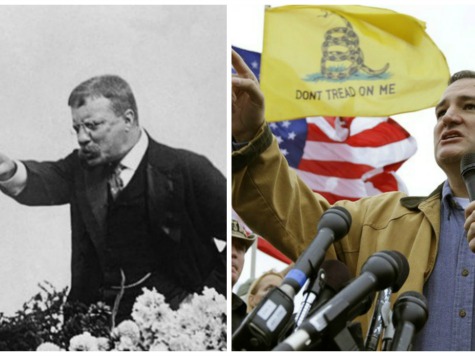At the Sorbonne in the Grand Amphitheater at the University of Paris on April 23, 1910, Theodore Roosevelt delivered one of his most famous and eloquent speeches. Roosevelt’s “Man in the Arena” speech was originally called “Citizenship in a Republic” and expounded on how the preservation of the republic required active and virtuous citizens.
Roosevelt seemingly lived many lifetimes in one, starting out as a sickly boy in a prominent New York Family and ending the most famous American of his generation. The sickly Roosevelt boy turned himself into a vigorous, driven man of seemingly endless energy. He became a western frontiersman, a historian, a politician, a soldier, the president of the United States, and a big game hunter among many other things, leaving an incredible record for posterity.
In Candice Millard’s The River of Doubt: Theodore Roosevelt’s Darkest Journey, she wrote that Roosevelt had “a voice that sounded as if he had just taken a sip of helium, but his outsized personality made him unforgettable–and utterly unresistable.” It was his outsized personality and incredible energy in the public sphere that made Roosevelt such and effective communicator and politician, and helped him become a character in the American imagination, culminating in his face being etched into Mt. Rushmore.
Roosevelt’s energy in the political arena did not mean that he neglected his studies or “book learning.” Roosevelt was a best-selling historian who poured a massive amount of work into researching his famous, and still definitive, book on the War of 1812, which re-established the Navy as a vital component of American power and prosperity. He ended up writing 35 books and was a legendary speed reader who read about a book a day.
However, there are rumors that some of Roosevelt’s unrelenting energy to fight in the public arena may have come from chemical enhancements. It has been speculated that he drank about a gallon of coffee a day, undoubtedly fueling his incredible propensity to work.
Though he was a political Progressive, it is important for patriotic Americans to understand the lessons of Roosevelt’s speech and enter the social and political arena to defend American values.
In the middle of the speech Roosevelt delivered the most famous quote:
It is not the critic who counts; not the man who points out how the strong man stumbles, or where the doer of deeds could have done them better. The credit belongs to the man who is actually in the arena, whose face is marred by dust and sweat and blood; who strives valiantly; who errs, who comes short again and again, because there is no effort without error and shortcoming; but who does actually strive to do the deeds; who knows great enthusiasms, the great devotions; who spends himself in a worthy cause; who at the best knows in the end the triumph of high achievement, and who at the worst, if he fails, at least fails while daring greatly, so that his place shall never be with those cold and timid souls who neither know victory nor defeat.
In an era in which liberty is on the decline, the economy creaks, and entrepreneurial dynamism is hampered by top-down government bureaucracy, many Americans have entered the arena to restore the founding principles of the nation. This has come in large part in opposition to the progressive principles stemming from Roosevelt’s generation that have reached a crescendo in our own.
While the country was in the grips of a catastrophic financial crisis, the Tea Party formed in opposition to the bipartisan political establishment. While both parties pushed for the federal government to bailout the institutions that were responsible for the mess and pay for their neighbor’s mortgage, the Tea Party entered the arena to restore ideas of individual rights and limited government.
On the Tea Party’s 5th anniversary, Mark Levin channeled Roosevelt’s Man in the Arena speech. He called on Tea Party activists and patriots to keep up the good fight and continue to put pressure on elected officials to reverse course and return to the principles of the Constitution. Levin said, “you are Americans. You cannot be idle. And you will not be silent while a relative handful of self-aggrandizing masterminds seek to lord over you and your fellow citizens.”
As a result of these everyday Americans entering the political arena, the course of politics has changed dramatically in just a few years. A wave of principled, limited-government candidates were swept into Congress and many articulate spokesmen of American principles, like Sens. Rand Paul (R-KY), Mike Lee (R-UT) and Ted Cruz (R-TX), entered the arena.
There has been a major pushback against policies that went unchallenged by America’s political establishment just a few years ago. One example is the fight, on grounds of federalism, against the now-controversial Common Core education standards that further nationalize education policy. This is just one among many issues in which there has been a major change of course in the last few years: mobilization against illegal immigration amnesty, opposition to the raising of the debt ceiling, an insistence that government malfeasance and corruption be investigated among many other issues have been a product of this influx of patriotic Americans in the national debates.
This incredible political change would have never happened if civic-minded Americans had been unwilling to step into the area and fight for their principles.

COMMENTS
Please let us know if you're having issues with commenting.